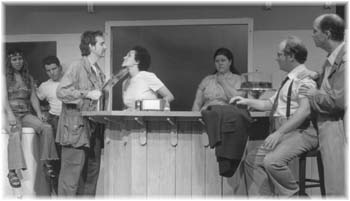The Color of History
Dining Out: The characters in 'Red Ryder' congregate for some emotional sustenance.
City Lights' 'Red Ryder' probes the political and social fault lines of 1969
By Anne Gelhaus
IN A MOVE AWAY from its tradition of staging lesser-known, more experimental works, City Lights Theater Company is bracketing its 1997-98 season with two well-established pieces of contemporary theater. The first, Mark Medoff's When You Comin' Back, Red Ryder?, bodes well for the second, Tom Stoppard's Rosencrantz and Guildenstern Are Dead. City Lights' current production of Red Ryder boasts strong direction by Ross Nelson and well-crafted performances by the bulk of the cast, all of which speaks to a solid understanding of the script's underpinnings.
The latter quality, lacking in several City Lights shows last season, is crucial to the successful staging of Medoff's and Stoppard's plays, both of which involve largely symbolic characters who embody larger social issues.
In Red Ryder, the deepest dreams and fears of a group of people trapped in a diner in New Mexico are catalyzed by Teddy, a drug-running drifter, played with resigned malevolence by Don Hiatt. Teddy's raison d'être is to wrest tortured confessions from the people he runs across, which he does through a combination of keen, often funny, insights, brute force and none-too-idle threats.
He's a Vietnam vet, but it's not clear if his conscience was killed in the war or if his almost complete lack thereof is what enabled him to function as a soldier. Teddy is a fascinating character, and the questions Hiatt answers about him through his portrayal inevitably lead to bigger, more complex questions.
The same holds true for Medoff's other characters, each of whom represents an aspect of the social chaos of 1969, the year in which the play is set. The title character, Stephen "Red" Ryder (Ted D'Agostino), is a throwback to the '50s and the innocence associated with that time. Red falls apart under Teddy's relentless scrutiny. His emasculation is emotionally painful to watch, but on an intellectual level it's easy to understand Teddy's desire to destroy the hypocritical "don't ask, don't tell" ethic that permeated that decade.
Richard and Clarisse, a well-heeled husband and wife, are evidence of another crumbling social tenet of the '50s, whereby men were automatically deemed the head of the household. By casting African-American actress ej Ndeto as Clarisse, director Nelson adds another dimension to the couple's story, introducing not only women's lib but civil rights into an already volatile mix. When Clarisse stands up for herself to Teddy--and, by extension, to Richard (John Kovac)--she's striking a blow for both her gender and her race.
The look of the production is oddly familiar, owing to the fact that scenic designer Rob Hamilton has basically just revamped his set for last season's Healin' Dirt Diner to accommodate this show. The feel, however, is more of things to come, and City Lights has set the scene for a memorable season.
[ Metro | Metroactive Central | Archives ]

Michael Selic
When You Comin' Back, Red Ryder? plays Thursday-Saturday at 8pm and Sunday at 7pm through Nov. 8 at City Lights Theater, 529 S. Second St., San Jose. Tickets are $12-$15. (408/295-4200)
From the Oct. 16-22, 1997 issue of Metro.
![[Metroactive Stage]](/stage/gifs/stage468.gif)